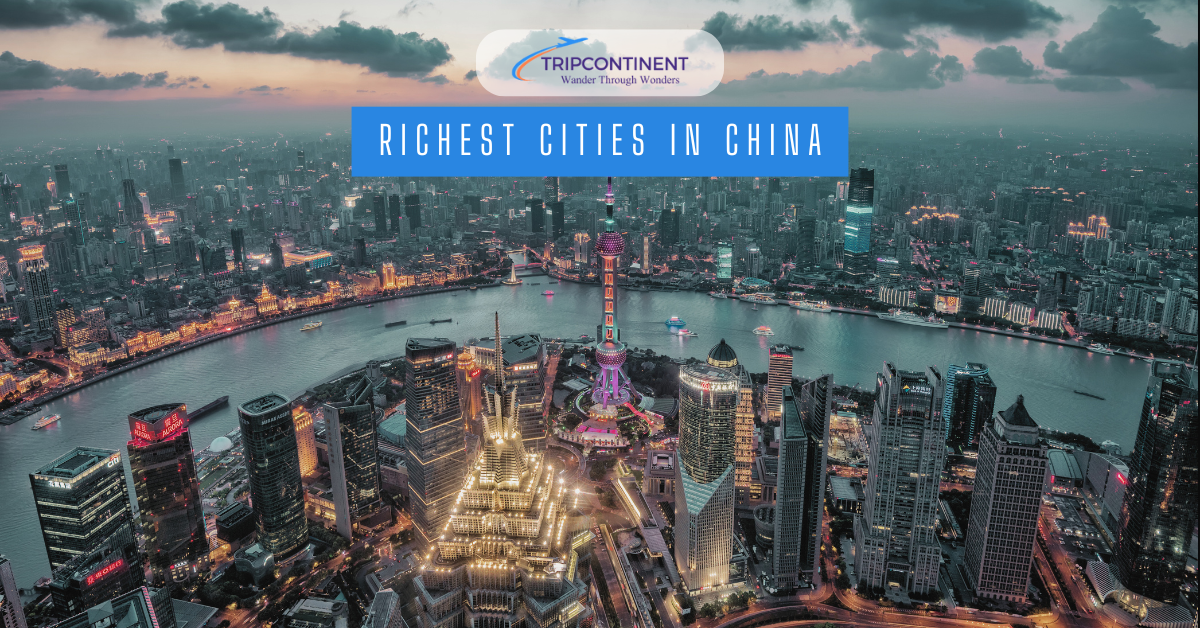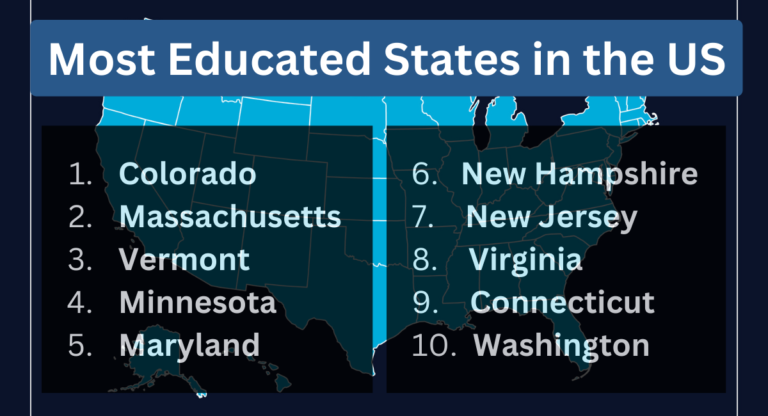A Look At The Richest Cities In China in 2024
China, a vast and diverse country, is home to some of the world’s most dynamic and prosperous cities. These cities have experienced rapid economic growth in recent decades, transforming from rural villages into bustling metropolises. From Shanghai, the country’s financial heart, to Beijing, the political capital, China’s cities offer a glimpse into the nation’s remarkable economic development.
In this blog, we will explore some of the Richest Cities in China and delve into the factors that have driven their economic growth. We will examine their unique characteristics, including their industries, cultural heritage, and quality of life. By understanding the factors that have contributed to the success of these cities, we can gain valuable insights into China’s economic development and its global impact.
A List of the 10 Richest Cities in China
The following is the list of the Richest Cities in China.
- Shanghai
- Beijing
- Shenzhen
- Guangzhou
- Hong Kong
- Suzhou
- Chengdu
- Hangzhou
- Wuhan
- Chongqing
1. Shanghai
Shanghai is one of the richest cities in China, known for its impressive financial and business sectors. As the country’s largest city and a global financial hub, it plays a key role in driving China’s economy. Shanghai’s economy thrives on a mix of finance, trade, real estate, and manufacturing, making it a major economic powerhouse.
The city’s GDP in 2023 was approximately $ 664 billion, making it one of the richest cities not just in China but globally. It is home to the Shanghai Stock Exchange, which is one of the largest stock exchanges in the world by market capitalization. Shanghai also houses the headquarters of major Chinese and international companies, including state-owned giants like China Petroleum & Chemical Corporation (Sinopec) and privately owned tech companies like Alibaba and Tencent.
One of the factors contributing to Shanghai’s wealth is its status as a global trading hub. Its port is one of the busiest in the world, facilitating international trade and connecting China to markets worldwide. The city’s location on the eastern coast and its modern infrastructure, including high-speed rail and well-connected airports, support its position as a trade leader.
Shanghai is also home to many of China’s leading banks and financial institutions, such as the Industrial and Commercial Bank of China (ICBC) and the Bank of China. These banks contribute significantly to the financial wealth of the city, with trillions of dollars in assets.
In addition to finance and trade, Shanghai has a booming real estate market. The city attracts investors from across the globe, further driving its economic growth and development.
You might also like: Oldest Cities in China
2. Beijing
Beijing, the capital of China, is not only the political center of the country but also one of its richest cities. The city’s economy is driven by a mix of industries including finance, technology, real estate, and culture. In 2023, Beijing’s GDP reached around $643 billion, making it one of the top cities in China in terms of economic output.
One of the key reasons for Beijing’s wealth is its role as the headquarters of many state-owned enterprises. These include some of the biggest companies in China, such as China National Petroleum Corporation (CNPC) and China Mobile. Beijing is also home to several large tech companies, such as Baidu and Xiaomi, which contribute significantly to its economy.
The city is a major financial hub with many leading banks and financial institutions headquartered here. The People’s Bank of China, which is the central bank, is located in Beijing. Additionally, major commercial banks like the Industrial and Commercial Bank of China (ICBC) and Bank of China have large operations in the city, managing billions in assets.
Another important contributor to Beijing’s economy is its real estate market. Property prices in the city are among the highest in China, attracting both domestic and international investors. The booming property market is supported by the city’s role as a center for education, government, and international diplomacy, which keeps demand high.
Beijing also benefits from its cultural and tourism industries. As one of the most visited cities in the world, it attracts millions of tourists each year who contribute to its economy.
3. Shenzhen
Shenzhen is one of the fastest-growing and richest cities in China. Known as the “Silicon Valley of China,” it has transformed from a small fishing village into a global technology and manufacturing hub in just a few decades. In 2023, Shenzhen’s GDP was around $507 billion, making it one of China’s top cities by economic output.
Shenzhen is home to some of the biggest tech companies in the world, including Tencent, the parent company of WeChat, and Huawei, a leading telecommunications company. These companies are not only significant contributors to the local economy but also help position Shenzhen as a leader in innovation and technology. In addition to tech giants, the city is a major manufacturing hub for electronics, producing everything from smartphones to drones.
Another reason for Shenzhen’s wealth is its location. It borders Hong Kong, which allows it to benefit from international trade and investment. Shenzhen has one of the busiest ports in the world, facilitating a large volume of exports and imports. Its proximity to Hong Kong has also attracted many multinational companies to set up offices in the city.
Shenzhen’s financial sector is also growing rapidly. The city is home to the Shenzhen Stock Exchange, one of the two main stock exchanges in mainland China. Many financial institutions, including banks and investment firms, have established operations in Shenzhen, further boosting its economy.
Real estate in Shenzhen is another important factor. Property prices have soared over the years due to the city’s rapid development and high demand from both businesses and residents.
4. Guangzhou
Guangzhou, the capital of Guangdong Province, is one of the richest and most important cities in China. It is known for its vibrant economy, driven by trade, manufacturing, and services. In 2023, Guangzhou’s GDP was approximately $498 billion, placing it among the top cities in China in terms of economic power.
One of the key factors behind Guangzhou’s wealth is its role as a major trading hub. The city is home to the Canton Fair, the largest and oldest trade fair in China, which attracts buyers and sellers from all over the world. This event highlights Guangzhou’s strong position in global trade. The city’s port is also one of the busiest in the world, handling massive amounts of imports and exports, particularly in electronics, machinery, and textiles.
Manufacturing is another important sector in Guangzhou. The city is a center for the production of automobiles, electronics, and household appliances. Companies like GAC Group (Guangzhou Automobile Group) and Midea, a leading home appliance manufacturer, have significant operations here, contributing to the city’s economic growth.
Guangzhou’s financial sector is also thriving, with many banks and financial institutions playing a key role in its economy. Major banks such as the China Construction Bank and the Agricultural Bank of China have large branches in the city. These institutions manage billions in assets and provide vital financial services that support businesses and industries across the region.
Real estate is another contributor to Guangzhou’s economy. As the city continues to expand and develop, property prices have risen, attracting both local and international investors.
5. Hong Kong
Hong Kong is one of the richest and most important financial centers in the world, making it a key player in China’s economy. With a GDP of about $335 billion in 2023, Hong Kong’s economy is driven by finance, trade, tourism, and real estate. Its unique position as a Special Administrative Region (SAR) gives it a high degree of economic autonomy, which has helped it thrive as a global business hub.
One of the major reasons for Hong Kong’s wealth is its financial sector. The city is home to the Hong Kong Stock Exchange, one of the largest in the world by market capitalization. It also serves as a major gateway for international investment into China and Asia, with many multinational banks, investment firms, and insurance companies having their regional headquarters in the city. Global banking giants like HSBC and Standard Chartered have a strong presence in Hong Kong, managing billions in assets.
Trade and logistics are also major contributors to Hong Kong’s wealth. Its port is one of the busiest in the world, handling large volumes of goods passing through Asia. The city’s free-market policies, low taxes, and business-friendly environment attract international companies, making it a major hub for global trade.
Real estate is another key factor in Hong Kong’s economic success. Property prices in the city are among the highest in the world, driven by strong demand and limited land space. Real estate development and investment play a significant role in the city’s economic activity.
Tourism is also a major industry, with millions of visitors each year. Hong Kong’s position as a cultural and shopping destination makes it attractive to tourists, who contribute to its economic growth.
Also read: Most Beautiful Islands in the World
6. Suzhou
Suzhou, located in Jiangsu Province, is one of the richest cities in China and is well-known for its historical significance as well as its modern economic strength. In 2023, Suzhou’s GDP was over $419 billion, making it a major economic player in China. The city’s wealth comes from a combination of manufacturing, technology, and trade.
One of the main reasons for Suzhou’s economic success is its strong manufacturing sector. The city is home to many factories that produce a wide range of goods, including electronics, machinery, and textiles. Suzhou Industrial Park, a major economic zone, houses many global companies such as Samsung, Bosch, and Siemens, which contribute significantly to the city’s economic output.
In addition to manufacturing, Suzhou is also a growing center for high-tech industries. The city has developed a robust technology sector, attracting businesses involved in software development, telecommunications, and biotech. The rise of tech companies in Suzhou is helping to diversify its economy, moving it from traditional industries to more advanced sectors.
Suzhou’s location near Shanghai gives it a strategic advantage in trade. The city benefits from its proximity to China’s financial center and its access to international markets. The Suzhou Port plays a vital role in facilitating trade, handling goods for both domestic and international export.
The city also has a flourishing real estate market. As Suzhou continues to grow, property development has become a major contributor to its economy.
7. Chengdu
Chengdu, the capital of Sichuan Province, is one of the richest and fastest-growing cities in western China. Known for its vibrant economy and cultural significance, Chengdu has a GDP of over $395 billion in 2023, making it an important economic hub in the region. Its wealth comes from a combination of industries, including technology, finance, manufacturing, and trade.
One of the major drivers of Chengdu’s economic growth is its technology sector. The city is home to several high-tech companies, including those specializing in software development, electronics, and artificial intelligence. Major tech companies like Intel and Huawei have significant operations in Chengdu, contributing to its status as a growing innovation hub. The Chengdu Hi-Tech Industrial Development Zone is a key area where many of these businesses are located, helping to attract both domestic and international investments.
Chengdu’s financial sector is also expanding rapidly. The city is home to a number of major banks and financial institutions, such as the Bank of Chengdu and Sichuan Trust. These institutions play a crucial role in providing financial services to the city’s businesses and industries, further boosting Chengdu’s economy.
Manufacturing is another important industry in Chengdu, particularly in sectors like automotive, aerospace, and electronics. Companies like FAW-Volkswagen and Chengdu Aircraft Corporation have large manufacturing facilities in the city, contributing significantly to its economic output.
Chengdu is also a key transportation and trade hub in western China. The city’s location along important trade routes, such as the Belt and Road Initiative, connects it to both domestic and international markets. Chengdu’s international airport is one of the busiest in China, facilitating trade and tourism.
Also see: The Great Wall of China
8. Hangzhou
Hangzhou, the capital of Zhejiang Province, is one of China’s richest cities, with a GDP of over $378 billion in 2023. Known for its blend of traditional culture and modern innovation, Hangzhou’s wealth comes from a diverse economy driven by technology, finance, trade, and tourism.
One of the key reasons for Hangzhou’s economic success is its thriving tech sector. The city is home to Alibaba, one of the largest e-commerce companies in the world. Alibaba’s presence has helped transform Hangzhou into a major tech hub, attracting other tech companies, startups, and entrepreneurs. This growth in technology has created thousands of jobs and fueled innovation in areas such as cloud computing, fintech, and artificial intelligence.
In addition to technology, Hangzhou’s financial sector is growing rapidly. The city is home to several major banks and financial institutions, such as the China Zheshang Bank. Hangzhou has also become a center for digital finance, with companies like Ant Group, which operates Alipay, a popular mobile payment platform, headquartered in the city. These financial services play a key role in supporting both businesses and consumers, contributing to Hangzhou’s economic development.
Hangzhou is also a significant trade and logistics hub due to its location near the Yangtze River Delta. Its close proximity to major cities like Shanghai and Ningbo gives it access to important domestic and international markets. The Hangzhou International Airport and its well-developed infrastructure further support trade and tourism, boosting the local economy.
Tourism plays a major role in Hangzhou’s wealth as well. The city’s scenic West Lake and rich cultural heritage attract millions of visitors each year, making tourism a significant source of revenue.
9. Wuhan
Wuhan, the capital of Hubei Province, is one of China’s richest cities, with a GDP of over $354 billion in 2023. Its wealth is built on a diverse economy that includes manufacturing, technology, education, and trade. Strategically located at the intersection of the Yangtze and Han rivers, Wuhan has long been a transportation and logistics hub, contributing to its economic strength.
Manufacturing is a key sector in Wuhan’s economy. The city is home to major industries, including automotive, steel, and electronics. Companies like Dongfeng Motor Corporation, one of China’s largest automobile manufacturers, have significant operations in Wuhan, providing thousands of jobs and driving economic growth. Wuhan is also a major center for steel production, with Wuhan Iron and Steel Corporation (WISCO) being one of the leading producers in the country.
Wuhan’s growing technology sector is another important contributor to its wealth. The city is home to several high-tech companies, focusing on areas like optoelectronics, biomedicine, and information technology. Wuhan East Lake High-Tech Development Zone, also known as Optics Valley, is a key area for tech innovation, attracting investments from both domestic and international companies.
The financial sector in Wuhan is expanding, with major banks such as the Bank of China and Industrial and Commercial Bank of China (ICBC) having large branches in the city. These financial institutions provide crucial support to businesses and industries, helping to fuel Wuhan’s economic development.
Education and research also play a vital role in Wuhan’s economy. The city is home to prestigious universities like Wuhan University and Huazhong University of Science and Technology, which drive innovation and attract talent from across the country.
10. Chongqing
Chongqing, one of China’s four directly administered municipalities, is a major economic powerhouse in southwestern China. With a GDP of over $482 billion in 2023, Chongqing is one of the richest and fastest-growing cities in the country. Its economic success is driven by a combination of manufacturing, trade, technology, and infrastructure development.
Manufacturing plays a significant role in Chongqing’s economy. The city is a key center for the production of automobiles, electronics, and machinery. Major companies like Changan Automobile, a leading Chinese automaker, have large operations in Chongqing. The city also has a strong electronics manufacturing industry, producing everything from laptops to smartphones for global markets. This industrial strength has helped create jobs and attract investment.
Chongqing’s strategic location on the upper reaches of the Yangtze River makes it an important trade and logistics hub. The city serves as a key link between western China and international markets, particularly through the Belt and Road Initiative. Chongqing’s port on the Yangtze River is one of the largest inland ports in China, facilitating both domestic and international trade. The city’s well-developed transportation network, including highways, railways, and airports, supports its role as a major logistics center.
The financial sector in Chongqing is also growing rapidly. The city is home to several large banks and financial institutions, such as the Bank of Chongqing and Chongqing Rural Commercial Bank. These banks play a crucial role in supporting the city’s industries and businesses.
In addition to manufacturing and trade, Chongqing is emerging as a center for innovation and technology. The city has been investing heavily in tech parks and innovation zones, attracting high-tech companies and startups, particularly in sectors like artificial intelligence, cloud computing, and biotechnology.
Here is a table listing the 10 richest cities in China:
| Rank | City | GDP (2023) | Description |
| 1 | Shanghai | $664 billion | Major financial and trade hub with a strong real estate market and home to the Shanghai Stock Exchange. |
| 2 | Beijing | $643 billion | Political and cultural center with significant contributions from finance, technology, and real estate. |
| 3 | Shenzhen | $507 billion | Technology and manufacturing powerhouse, known as the “Silicon Valley of China.” |
| 4 | Guangzhou | $498 billion | Key trading hub with strong manufacturing and financial sectors. |
| 5 | Chongqing | $482 billion | Fast-growing city with a focus on manufacturing, trade, and technology. |
| 6 | Chengdu | $395 billion | Diverse economy with strengths in technology, manufacturing, and trade. |
| 7 | Hangzhou | $378 billion | Tech-driven economy with major companies like Alibaba and a growing financial sector. |
| 8 | Suzhou | $419 billion | Strong in manufacturing and technology with significant real estate development. |
| 9 | Wuhan | $354 billion | Important manufacturing and technology hub with a strong education sector. |
| 10 | Hong Kong | $335 billion | Global financial center with a robust trade and real estate market. |
Final Words
So, these were the Richest Cities in China. While these cities have achieved significant economic success, it is important to note that they also face challenges, such as income inequality, environmental concerns, and rapid urbanization.
As China continues to play a major role in the global economy, its cities will remain at the forefront of economic growth and development.
FAQs
What Is the Highest Paid City in China?
Shanghai is generally considered the highest-paid city in China. It has consistently ranked at the top of lists regarding average salaries and offers a wide range of high-paying job opportunities in various sectors, including finance, technology, and manufacturing.
Who Are the Top 3 Richest People in China?
Recently, the top 3 richest people in China are:
- Zhong Shanshan: Known for his beverage company Nongfu Spring and pharmaceutical investments, Zhong Shanshan is the wealthiest person in China.
- Ma Huateng: The founder of Tencent, a leading technology conglomerate behind popular apps like WeChat and QQ, Ma Huateng is the second richest person in China.
- Huang Zheng: The founder of e-commerce giant Pinduoduo, Huang Zheng is the third richest person in China.
What Is the Poorest Region in China?
Xinjiang is generally considered the poorest region in China. It is a vast and sparsely populated region located in the northwestern part of the country, bordering several Central Asian nations. Despite its rich natural resources, Xinjiang faces several challenges, including geographical isolation, harsh climate, and ethnic tensions.
What Is the Religion of Most of China?
The majority of Chinese people identify as atheists. While there are a number of religious practices and beliefs in China, including Buddhism, Taoism, and Confucianism, the Chinese government promotes atheism and discourages organized religious activity.
What Is China’s Ghost City?
The term “ghost city” was first used by photographers and journalists documenting the Kangbashi District. Located in Ordos (Inner Mongolia), Kangbashi is one of the largest and most well known ghost cities.

I’m Sophia Jones, an adventurer at heart from New York City, USA. I live for travel and exploration, always eager to discover new places, meet fascinating people, and try out diverse cuisines. Over the past few years, I’ve traveled to numerous countries, immersing myself in different cultures and creating unforgettable memories.






